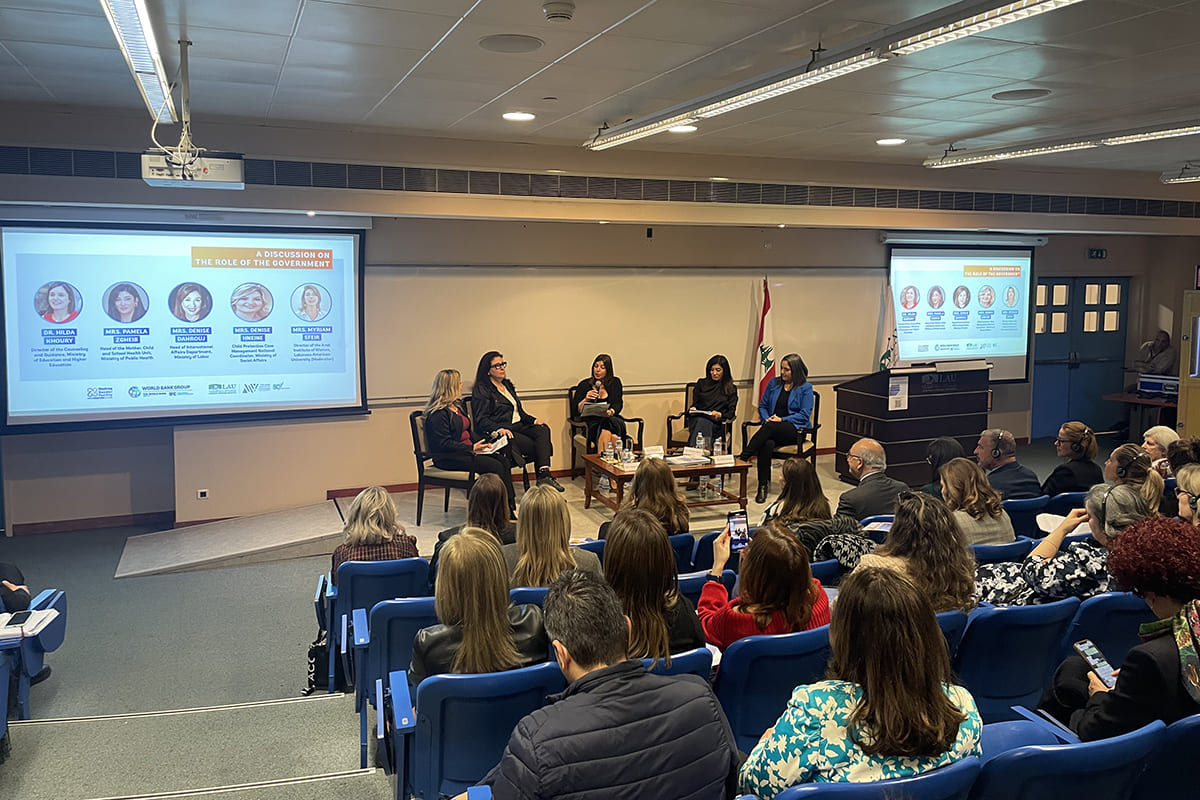Quality Childcare is the Key to Women’s Empowerment in the Workforce
LAU’s Arab Institute for Women hosts an event focused on the release of the first national report on childcare services in Lebanon by the World Bank.
With just 22 percent of Lebanese women between the ages of 15 and 64 in the workforce, Lebanon’s potential for economic growth remains largely untapped. This has been attributed largely to the lack of access to quality childcare.
The direct relationship between childcare services and women’s low participation has been confirmed in an extensive report by the World Bank titled Comprehensive Assessment of the Childcare Landscape in Lebanon, which was revealed during an event held by LAU’s Arab Institute for Women (AiW) on March 27, 2024 at the Beirut campus. Attendees included World Bank representatives, stakeholders, academics, students, and government officials from both national and international levels.
The report delves into the supply and demand of childcare services in Lebanon demonstrating how the absence of a regulatory framework for childcare forcibly leads to women’s withdrawal from the workforce. It speaks to the AiW’s and LAU’s efforts to promote friendly work practices nationally and revise parental leave policies to empower women and boost economic growth.
By building strategic collaborations such as the one with the World Bank, and connecting academics with practitioners and policymakers, said AiW director Myriam Sfeir, “we strive to address gender justice in all its forms,” and enact social and policy change.
In his welcoming note, LAU President Michel E. Mawad commended the speakers and participating partners for their dedication to children’s welfare and the sincerity of their efforts in providing children with the best opportunities.
Commenting on the disproportionate time that women spend on unpaid care work compared to men—which is notably more pronounced in Arab states—Canadian Ambassador Stefanie McCollum affirmed her country’s commitment to addressing the disparity. Since October 2023, the Canadian government has also been collaborating with the AiW and the UNDP to redress another disparity, that of women’s participation in leadership.
The aim of the report, said World Bank Country Director Jean-Christophe Carret, is to help Lebanon advance its development agenda, by setting “the ground for an informed and evidence-based dialogue with the government and relevant stakeholders regarding legislative reforms in childcare policies.”
To that end, he added, it “proposes measures for an inclusive expansion of quality and affordable childcare services in several areas,” beyond the coastal region where private and costly services are now concentrated.
Childcare services—namely for newborns up to three-year-olds—are mostly privately owned and center-based rather than home-based, and overseen by a fragmented network divided between the Ministry of Public Health and the Ministry of Social Affairs without an officially unified curriculum, noted Angela Elzir Assy, a social protection and labor market specialist at the World Bank and lead of the International Finance Corporation (IFC) team.
As a result, given the socioeconomic challenges and prevailing stereotypes that cast women primarily as caregivers, mothers end up staying at home. Re-entering or remaining in the workforce is made all the more difficult for them due to the lack of comprehensive family-friendly policies, such as paternity leave, family leave, extended maternity leave and flexible work.
Quality childcare, added Assy, is not only important for women’s empowerment but also for family and child welfare, economic growth and productivity. In Quebec, she added as an example, improved access to universal, low-cost childcare led to a 3.8 percent increase in employment boosting the city’s GDP by 1.7 percent.
“Treating social infrastructure and childcare should be regarded as investments rather than wasted expenses,” noted Keynote speaker and Member of Parliament Inaya Ezzedine, who also heads the Women and Children Parliamentary Committee. Advancing childcare as part of family-friendly policies, she added, leads to an investment in human capital through early childhood education, giving women the right to choose to work, and extending social protection to all caregivers.
Support for working mothers typically comes from family-friendly policies outlined in labor laws, such as mandatory maternity leave. On that subject, Dr. Ali Fakih, professor of applied economics and chair of the economics department, shared his research findings on childcare provisions and women’s economic participation, highlighting the need for accessible childcare services to employees when it comes to implementing family-friendly practices.
In addition to hosting keynote speakers on the subject, the event held a panel discussion featuring women leaders in the ministries of education, public health, labor, and social affairs.
The evidence-based discussion, enriched with practical experience, aimed to highlight “the cross-ministerial dimension of the childcare agenda and the importance of adopting a consolidated, holistic approach,” said Sfeir.
